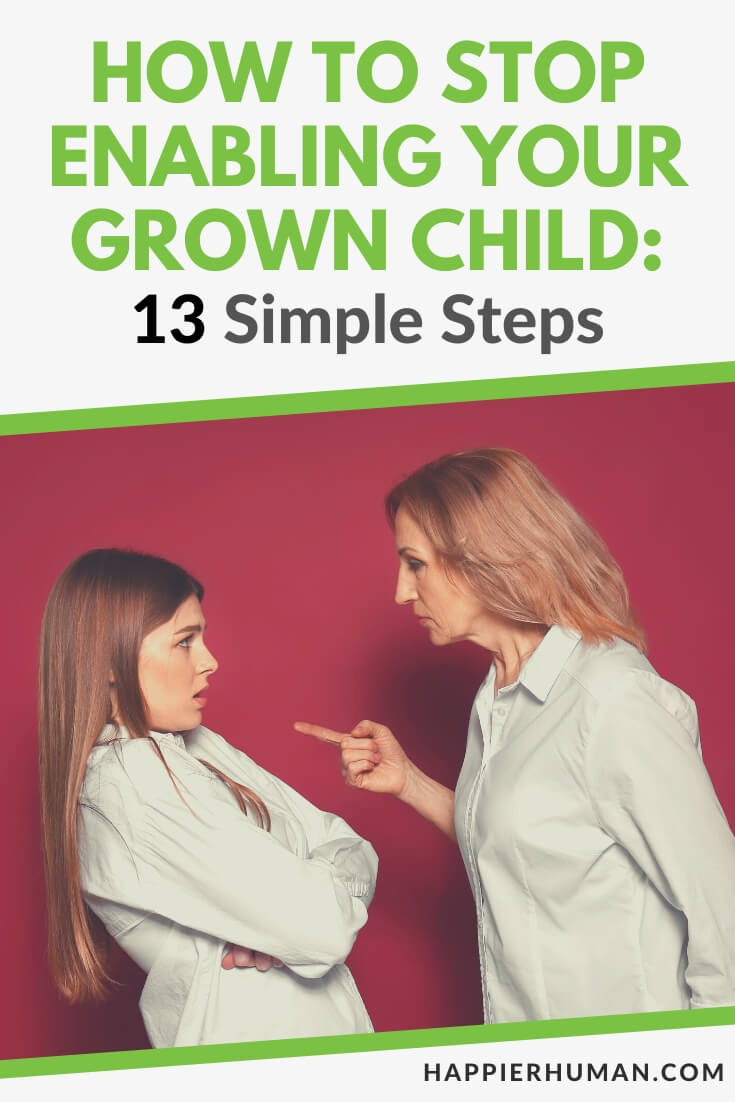Helping your grown child comes with the territory of being a parent. Going above and beyond the call of duty to please them is where the problem lies.
Always trying to meet their needs could become harmful to their independence and well-being. A guide on how to stop enabling your grown child could be a useful resource for putting an end to this unhealthy behavior pattern that impairs their independence.
The context within which enabling occurs varies from one family to another. However, a lot of discussion on the topic relates to enabling an adult child who is struggling with substance abuse and addiction.
Several reasons have been put forward for why parents support children in ways they shouldn’t. Lack of boundaries and codependency are two factors linked to enabling, which I’ve touched on in passing.
Learn more about what causes parents to enable their children, the harmful effects on parents and children, and ways to stop enabling practices. I hope you leave here eager to make the changes and allow your child to take charge of their own life.
What Is Enabling?
Enabling is specific behaviors by one individual that allow another person to continue their self-destructive patterns of behavior. Enabling is common in close relationships, particularly where a culture of codependency is a part of the relationship dynamic.
The person being enabled could be a spouse, child, relative, or friend. The permissive individual, called the enabler or caretaker, believes they are protecting the person receiving help.
In this case, enabling can show up as making excuses for the child’s addictive behaviors, such as drug and alcohol abuse. Another example is intervening to save them from the consequences of their mistakes. Perhaps you do their chores or habitually bail them out of financial woes.
Something as seemingly harmless as allowing a child over the age of 21 to remain in the household indefinitely, while they’re unemployed but capable of working, is another common type of enabling conduct.
However, the tendency to support problematic lifestyles makes it difficult for the beneficiary in the relationship to stop harmful behaviors. Some enablers are aware what they’re doing isn’t helpful.
They also witness the consequences, but simply brush things aside. For some family experts, this is nothing short of toxic parenting.
Dangers of Enabling an Adult Child
Whatever the motivation behind enabling, the practice is more harmful than helpful to the child and the parent, in the long run. Too much helping can create the following issues:
Even though you may be acting in good faith, protecting your child from experiencing the full impact of their decisions and the consequences of their behaviors stifles their mental, cognitive, and emotional growth.
Why Do Parents Enable Grown Children?
Helping grown children is often a well-meaning gesture by parents, but turns into enabling when there is a lack of boundaries on how far they’re willing to go to help. They end up ‘creating a monster,’ when all they intended to do was make life easier for the child. Other factors include:
The Fixer/helper mentality – Many parents over help and try to solve their children’s problems because they’re parenting out of guilt or low self-esteem. In other cases, they are actually trying to correct mistakes they made that affected the child, so they overcompensate.
A lack of awareness – The nature of parenting and caregiving makes it so easy to blur the lines between helping and enabling. More so in families where the parent is overly involved or overprotective (helicopter parenting). As such, enabling is often done without awareness of their actions or the consequences.
Feeling helpless or powerless – Even though the enabler parent might be aware of the child’s destructiveness, they feel powerless to prevent it, according to the American Psychological Association (APA). A sense of helplessness can also come from being a people-pleaser or not wanting to hurt the child’s feelings.

Co-dependency – enabling is a sign of and a part of the pattern of codependency. In a co-dependent parent-child relationship, the parent does more than caregiving. They act as a rescuer and a fixer for the child.
They wind up supporting their destructive behavior as a result. In some cases, the codependency might be so strong that the parent experiences fear and separation anxiety at the thought of letting the child move away to start life on their own.
Interestingly, it doesn’t always mean the child is asking for help. Overprotective, over-involved parents, tend to sense and anticipate their child’s needs (financial, emotional, etc.) and attempt to meet those needs before the child asks.
The child grows more and more dependent on the parent, since they hardly get the chance to think and act for themselves. They might think what’s the point of having a job or doing anything meaningful in life when mom or dad is handing them everything on a silver platter.
13 Easy Steps for Stopping the Cycle of Enabling
Breaking the cycle of enabling and codependency requires you to make drastic changes that will encourage your child to meet their own needs.
As a parent who went through a similar experience, I’d like to challenge you to step back and limit your involvement using these and other effective strategies.
#1. Question Your Over-Involvement
Watching a child transition to living on their own is a bittersweet moment for parents. The transition marks independence. Unfortunately, many parents struggle to facilitate their child’s independence the right way.
If you’re having trouble in this area, could your over-generosity or helper mentality be the problem? Be brutally honest with yourself.
More people agree that young adults should be financially independent by age 22, according to the results of a survey by Pew Research Center.
In reality, only 24% were found to be financially independent from their parent by that age. More stunningly, nearly 50% of all adults between the ages of 18 and 34 receive financial assistance from their parents.
Could parental enabling be a key factor? Based on the same Pew report, the majority of Americans feel parents are doing too much for their young adult children.
#2. Admit You’ve Messed Up
As parents, we don’t like to accept that we are wrong, when in fact we can be just as flawed as the kids we are raising. Codependency between you and your child could not have happened without you.
Since you’re a vital part of the equation, you first have to take a hard look at your own behavior.
You have to call out yourself for your contribution to the problem. Behavioral therapists call it taking accountability for your actions. Accepting your missteps, and owning up, is often the first step to positive change, healing, and recovery for relationships affected by enabling and codependency.
#3. Tell Your Child NO
People-pleasing is at the heart of enabling behaviors. For one reason or another, you’re afraid or unwilling to turn down your child’s requests for assistance.
It’s okay to say, “No” or “I am not able to do that.” Plain and simple. Just like that, you’ve established boundaries. Don’t even bother to explain yourself if you don’t think an explanation is warranted.
Trust me, they know you’ve been overextending yourself for them, whether it was paying their car note or bringing them alcohol, knowing fully well they have a drinking problem.
The first time you refuse will shock the hell out of them, but hey, they’re going to survive it. The more you say no and double down whenever they try to ‘twist your arm’, the better you’ll get at resisting the temptation to swoop in and save them.
Be prepared for them to whine or guilt-trip you into feeling sorry for them. Stick to your decision.
#4. Explain Why You’re Pulling Back
Denying your child the things they were used to for so long, things adults should be doing on their own, can really be a teachable moment.
Your decision to limit your involvement in their life might be met with pushback. Don’t worry, they’ll learn to accept the changes eventually.
In the meantime, capitalize on the opportunity to teach them a valuable lesson. Explain why you’re saying no and do so in a loving way. You’ll help your child understand your decision.
They may not like it at first. They may act disrespectfully or respond with a sense of entitlement. Don’t worry, they’ll eventually realize you’ve made the right decision out of love and to protect their well-being.
Don’t be surprised if they personally thank you in the future for ‘cutting’ them off, once they recognize how it promoted their independence.
#5. Let Your Child Make Their Own Decisions
Quit hovering over your child and trying to control their life. You'll only make them feel you're treating them like a child and may resent you for it. Allow them to make independent decisions.
You can only hope and trust they’ll do the right thing. Of course, they will make mistakes, but by stepping back, you’re encouraging them to build their problem-solving skills.

If they do come for help, encourage them to brainstorm solutions. Remind them to consider the consequences of their actions. Reassure them that you’re confident they’ll do the right thing. That ought to boost their self-confidence and convey that you trust them to be an adult.
Bit by bit, they’ll grow independent and eventually stop running to you for help. You can still function as an adviser in their life but refrain from taking over.
#6. Stop Bailing Out Them Financially
Now that you’ve started to say, “No,” it’s time to back that up with action. You can’t keep stepping up to the plate financially for children who are able-bodied and should have a job by now.
I agree some children do need a little bit more of a push toward independence than others. For example, young adults who are in college or have some form of impairment.
However, there has to be an end-point. You should not function as a bank for young adults living on their own who can’t make rent. Similarly, don’t pay their car notes or credit card bills. Let them know that’s what adulting is all about.
Depending on the circumstances, you could agree to lend them money with the understanding that they have to repay you.
#7. Point Them to Helpful Resources
Give a man a fish and feed him for a day. Teach him to fish and feed him for life. This profound Bible scripture holds true in a situation where a parent is enabling a child. Teaching them how to help themselves by directing them to the right resources can help solve some of their problems.
Consequently, you won’t need to step and assist. For example, suggest where to look for employment. Getting a job or career will create financial independence.
Encourage them to go to rehab if they’re struggling with addiction instead of supporting their addictive behaviors. Rehab will help them regain their sobriety and stay out of trouble associated with addiction. More importantly, they’ll be able to work and live a productive life.
#8. Work on Building Self-Esteem
A lack of belief in your ability to be a good parent is a sign of low self-esteem. Poor self-perception may make you feel inadequate. You’re probably attempting to meet your child’s needs to gain a sense of value and purpose.
At times, you may try harder to gain their approval and love. While you may derive a sense of worth after helping, you’re reducing your child’s independence at the same time.
Increasing self-esteem involves self-forgiveness and self-compassion. See yourself as a good parent regardless of your shortcomings. Reassure yourself that setting boundaries doesn’t make you a bad or selfish parent.
It’s actually part of self-love and self-care. As you keep prioritizing your needs ahead of your adult child’s, you’ll become more self-confident and less worried about not being good enough.
#9. Give It Time
Figuring out how to stop enabling your child in a way that is loving and healthy isn’t always easy. Ending the cycle also doesn’t happen overnight. Being patient and compassionate toward yourself will make the process much easier.
Chances are, the codependent relationship was created earlier in their childhood and continued into adulthood. We’re talking about undoing years of enabling, so it will take time, effort, and a commitment to ending the unhealthy parenting style.
You may slip up along the way and feel sorry for them and provide help. You’re human. That’s to be expected as you reprogram your brain to say, “No,” and enforce boundaries that have been put in place to facilitate the transition out of codependency.
#10. Find Out More About Codependency
Codependency is a dysfunctional dynamic seen in families and romantic relationships, yet not many people have ever heard of its effects.
In a codependent relationship, between two people, one person enables unhealthy behaviors and the person being enabled feels like they can’t function without the enabler.
So they sort of feed off of each other and benefit in some way. The person doing the enabling is the primary giver and is usually in it for emotional satisfaction, e.g., to feel good about themselves. The other person usually gains by getting their physical, financial, or emotional needs met.
Find out if any of these 15 Codependent Personality Traits and Characteristics apply to your family dynamics and how to end codependency.
#11. Learn How to Self-Validate
An eagerness for constant approval from your child could be what’s driving your desire to meet whatever needs they have. You may know helping only makes matters worse, but you feel helpless to stop yourself.
You’re probably afraid they’ll get mad or cut you off if you refuse to support their destructive habits.
Validating yourself can serve as a protective armor if your child tries to make you feel guilty, insecure, or worthless because you didn’t do as they expected. Start self-validating by accepting your strengths, flaws, and mistakes.
Remind yourself that you’re enough regardless. Be your own cheerleader. Accept that you’re not perfect but still give yourself credit for your efforts as a parent.
#12. Stop Being Your Child’s BFF
Getting too wrapped up in your adult child’s life can come from not having a social life or close friends. You may end up spending a lot of your time talking to them about their life or oversharing private things about yours.
The line between parent and child can become blurred the more you confide in or lean on them for emotional support or validation. In return, you feel obligated to be there for them at all costs, just as you would for a best friend.

End this codependent, enabling dynamic by learning to become emotionally independent. Grow your social network or connect with a local parenting group where you can share your thoughts, feelings, and experiences with your peers.
The more you begin seeing your child as a separate individual, the more inclined you’ll be to let them fend for themselves.
#13. Get Help to Stop People-Pleasing
Some of the unhelpful things we do as parents are rooted in our core belief system. For example, believing we’re bad parents if we’re not always there to help our children.
Some of it can come from low self-esteem. According to psychologists, helping could be how we derive our sense of self-worth.
Talking to a therapist can help you uncover the link between enabling and your belief system. Your therapist can help you explore skills for managing that innate desire to people-please even to your own detriment. Skills include how to set realistic boundaries and put your needs ahead of others.
Final Thoughts on How to Stop Enabling Your Grown Child
In my opinion, as a parent, the worst thing we can do is raise dependent kids… when we’re supposed to be teaching them to think, feel, and do things for themselves. By enabling them, we diminish their chances for survival on their own when we’re no longer around.
Ending the cycle starts by identifying your role in the situation. Help by providing love and support, but do not enable.
And while you may feel like you’re turning your back on your child, or betraying them, by taking away your assistance… trust me, you’re doing the right thing. It will help save them from the damaging effects of codependency.
Helping VS Enabling: 9 Differences You Should Know is an eye-opening article that details behaviors you may not know are harmful. Be sure to check it out before you go.


